Written by Van Bryan, Contributing Writer, Classical Wisdom
Classical Wisdom for Modern Minds
You remember our mandate.
Here we believe classical wisdom can ring true for modern minds. The great minds of classical antiquity still have much to teach us. You need only show up to class.
And if you’d like to know how this story ends, then open your copy of The Republic. It is to book VIII that our attention turns.
There, Plato presents a vision that is unnerving, unwelcome, and (probably) unwanted.
The Five Regimes
Living during the late fifth and early fourth century BC, Plato was the student and disciple of that granddaddy of classical philosophy, Socrates.
It was once believed that all a philosopher really needed to know could be found in Aristotle’s Nicomachean Ethics and Plato’s The Republic.
That’s overstating it, of course.
But give the old teacher his due.
The Republic is ambitious in its scope. Written in the Socratic dialectic tradition, the text tackles subjects spanning from ethics… epistemology… and—important to us—politics.
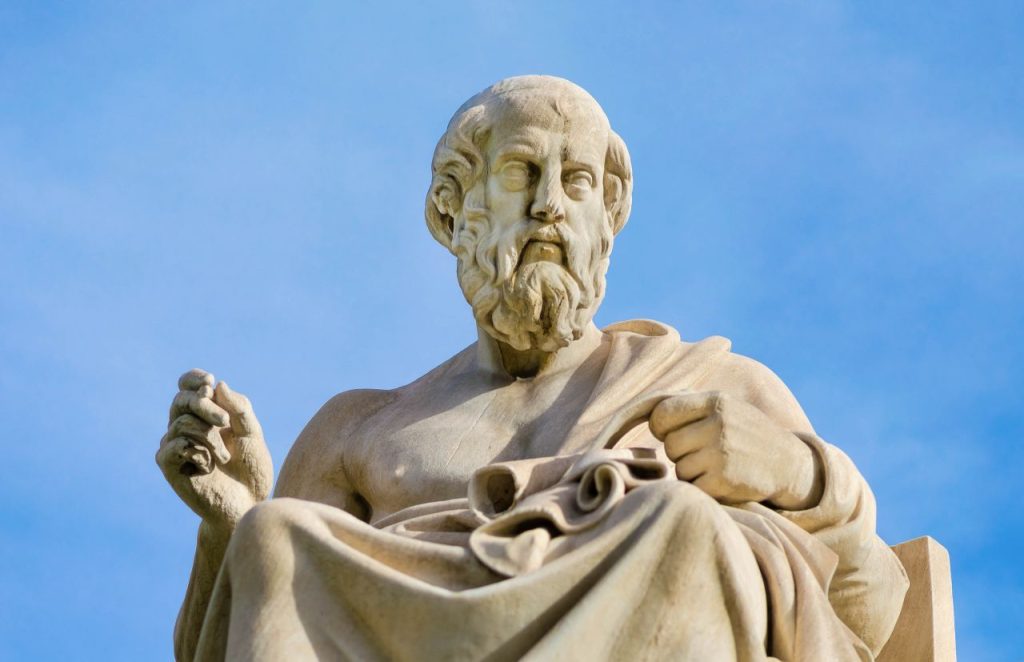
Marble statue of the ancient Greek philosopher Plato. Academy of Athens, Greece.
It remains one of the most influential pieces of literature in human history.
It is in book VIII where Plato describes the transitions of the “five regimes.”
They are…
- Aristocracy (ruled by a just king)
- Timocracy (ruled by warriors and generals)
- Oligarchy (the rich rule over the poor)
- Democracy (power is distributed evenly)
- Tyranny (strongman leader, the most unjust regime)
Each regime—Plato says through the voice of Socrates—degrades and bleeds into the next.
It is the transition from oligarchical to democratic state that interests us.
In the oligarchical state, “the rich have power and the poor man is deprived of it.”
The oligarchs are the movers. The shakers. Today, they would have lobbyists, multi-billion-dollar government contracts, and modern offices in Northern Virginia.
Call them cronies. Call them “The Elite.” Call them the Deep State!
Plato calls them oligarchs…
Plato also tells us that oligarchies have “both the extremes of great wealth and utter poverty.”
We return only briefly to the 21st century to share a chart, created by America’s Federal Reserve and published by Bloomberg.

Dear reader, you don’t pay us to cheer for the winners. Or howl for the losers.
In fact, you don’t pay us at all!
Which makes our observations on this matter worth at least what you paid for them.
So, while we’re at it, let’s consider the question.
What shall the downtrodden do?
Rise up!
Classical Athenian Autonomous Zone
It is now that Plato introduces the drones. Think of them like murder wasps swarming around an otherwise productive honeybee hive.
Buzz. Buzz.
There are two classes of drones. Some with stings. And some without.
The latter “who in their old age end up as paupers.” But those with dreadful stings are of “the criminal class.”
The drones have no desire but to stir up trouble. They are to the polis “what phlegm and bile are to the body.”
The drones are always seeking to get a little “honey” from the oligarchs.
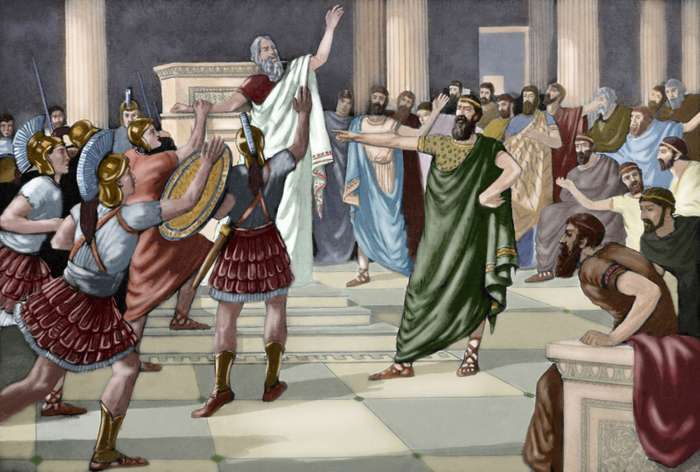
Critias, one of the Thirty Tyrants, ordering the execution of Theramenes, a fellow member of the oligarchy that ruled Athens in 404–403 BCE.
And it is the sting of the drones that compel the people to revolt.
The oligarchs, in turn, get tough!
Writes Plato…
And the end is that when [oligarchs] see the people, not of their own accord, but through ignorance, and because they are deceived by informers, seeking to do them wrong, then at last they are forced to become oligarchs in reality; they do not wish to be, but the sting of the drones torments them and breeds revolution in them.
But it is no use, dear reader.
Not tear gas… nor curfews… nor anguished pleas from elected leaders can stop the drones once their blood is up.
The demos eat the rich. Confiscate their property. And divide it amongst themselves. Welcome to the Classical Athenian Autonomous Zone, CAAZ!
The drones… of course… “reserve the largest for themselves.”
The oligarchical state has been washed away. Democracy reigns.
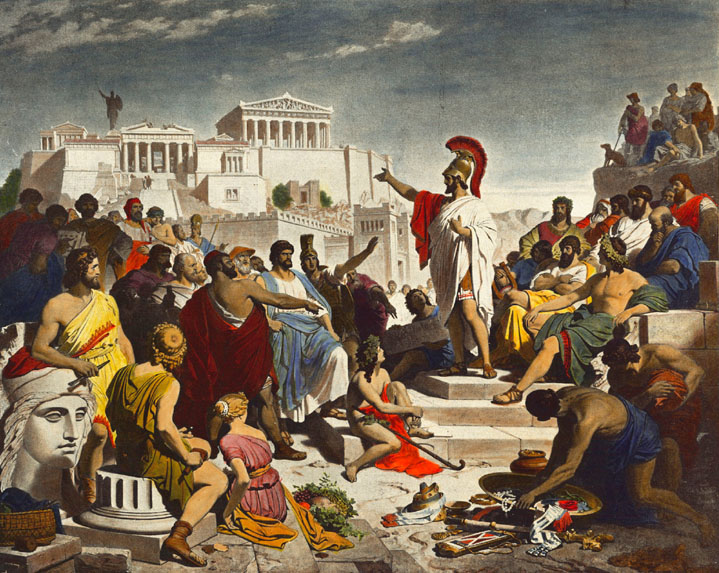
Pericles’ Funeral Oration (Perikles hält die Leichenrede) by Philipp Foltz (1852)
It’s important we understand Plato’s democracy.
It is not the measured, thoughtful constitutional democracy we learn of in Civics 101.
In Plato’s democracy, there are no checks. There are no balances. There is no separation of powers.
There are only the drones, and the mandate for 51% of the population—or perhaps even a vocal minority—to hoist popular fantasies onto the soul of the state.
You see where this is going…
American Drones
You know these drones, dear reader.
They set up “autonomous zones” and topple historical monuments in the dead of night.
They call for blood on Twitter and “dox” their opponents.
They post in suspicious 4Chan message boards.
They have distinguished careers on CNN… and Fox News.
They sting. And sting. And sting.
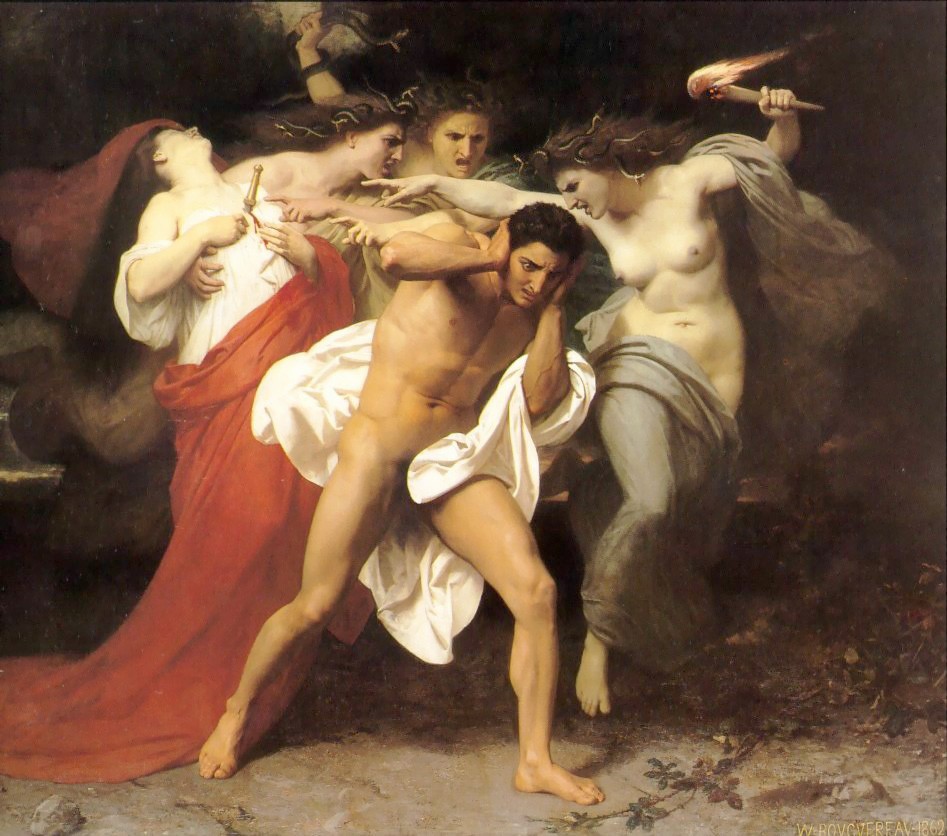
Having killed his mother, Orestes is Pursued by the Furies, by William-Adolphe Bouguereau.
And it is the stings that ferment hate into the well-intentioned pleas from the people. They “breed revolution” into justified movements for dignity and equity.
And yes, there are such movements. We mustn’t be misunderstood on this point.
Socrates saw his countrymen wallowing in the shade of ignorance and attempted to bring them to the light through peaceful—albeit uncomfortable—methods.
Treat your fellow man (or woman!) with dignity, we say. And speak up without doing harm.
Our quarrel is not with the demos. It is with the drones.
Because then comes the bloodletting.
The people—confused by the drones—nurse some champion (perhaps champions) into greatness.
The democratic champion(s) do away with their enemies by false accusations and banishments.
Plato:
[H]aving a mob entirely at his disposal, he is not restrained from shedding the blood of kinsmen; by the favorite method of false accusation he brings them into court and murders them, making the life of man to disappear, and with unholy tongue and lips tasting the blood of his fellow citizen; some he kills and others he banishes, at the same time hinting at the abolition of debts and partition of lands.
You know this tactic as “cancel culture,” which we have discussed previously.
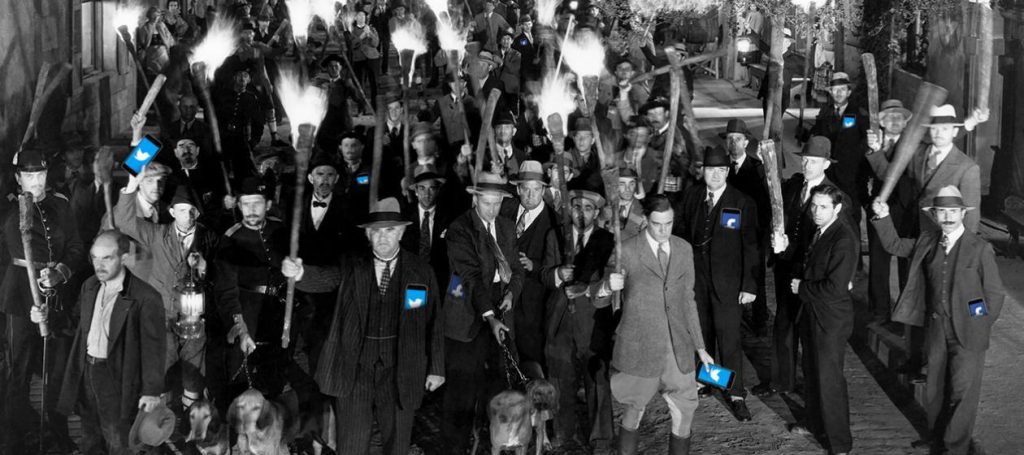
Illustrated | Glasshouse Images/Alamy Stock Photo.
It’s become a cowardly mob of upper-class social media addicts, Twitter Robespierres who move from discipline to discipline torching reputations and jobs with breathtaking casualness.The leaders of this new movement are replacing traditional liberal beliefs about tolerance, free inquiry, and even racial harmony with ideas so toxic and unattractive that they eschew debate, moving straight to shaming, threats, and intimidation.
Yes, dear reader. The drones have no need for discussion.
Maybe we should give this guy a chance to speak…
Hey… should we really set that on fire?
None of that…
Get on board this train or it will run you over.
And what is to become of Plato’s democratic state?
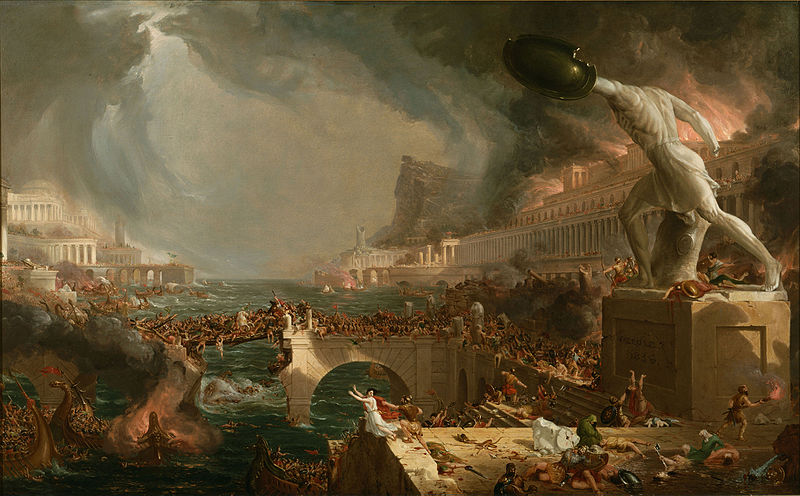
The Course of Empire (Series of paintings by Thomas Cole): Destruction (1836).
Tyrant Absolute
Overrun by the buzzing, stinging drones, there can only be one conclusion.
Plato once more [emphasis is mine]:
And he, the protector of whom we spoke, is to be seen, not ‘larding the plain’ with his bulk, but himself the overthrower of many, standing up in the chariot of State with the reins in his hand, no longer protector, but tyrant absolute.
How does this story end?
Are you certain you want to know, dear reader?
It ends the way every story of an empire ends. Slowly at first… then all at once.
Impossible you say?
Don’t be so sure.
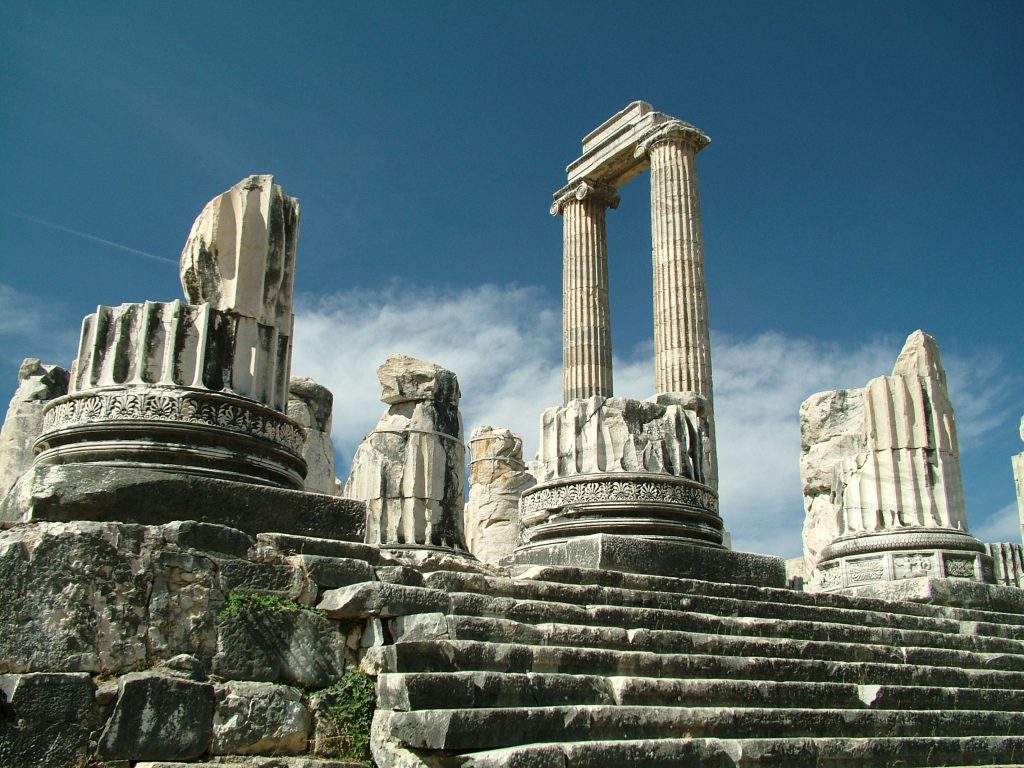
Ancient Greek ruins.
We quote the writer Peter Savodnik of Tablet, writing on the parallels between mid-19th century Russia and 21st century America…
[I] was wary of historical analyses that sought to trace major events like the Russian Revolution to any one turning point, but that we might think of this period, starting with the liberation of the serfs and culminating with Sergei Nachayev’s Catechism of a Revolutionary, as the moment, or series of moments, when the language of nihilism and death acquired a certain currency and the possibility of the end of the old order came into focus.[…]The metaphysical gap between mid-19th-century Russia and early-21st-century America is narrowing. The parallels between them then and us now, political and social but mostly characterological, are becoming sharper, more unavoidable.
That’s right.
We are not special.
We never were.
As Savodnik points out, history does not necessarily repeat itself. But we can “[descend] into a primal state we thought we had escaped forever.”
When? How?
We don’t know…
Even Czarist Russia limped on a few more decades from the mid-1800s before it collapsed to Bolshevism.
But have some imagination.
Peer over the horizon, dear reader. Look past the vanishing point.
And squint…
What do you see?
Buzz. Buzz.

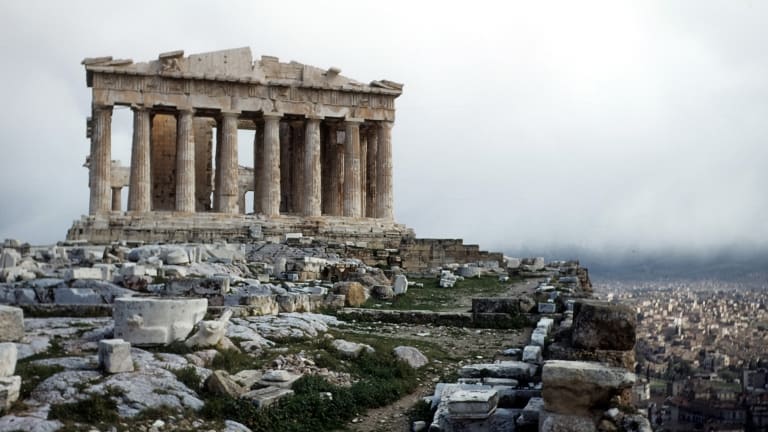








2 comments
We are not special?
The American Exceptionalists will not take kindly to that idea.
Statistics Assignment Help
statistics help
Statistics Homework Help
statistics homework
statistics homework helper
Help With SPSS
SPSS Help
SPSS assignment help
SPSS Homework Help
matlab homework help
matlab assignment help
help with matlab homework
help with matlab assignment
matlab assignment help australia
stata homework help
probability assignment
probability assignment help
R Programming homework help
Bio Statistics Assignment Help
rstudio assignment help
r homework help
r assignment help
help with r assignment
rstudio homework help
r homework assignments
r programming help
r assignments
do my r homework
r programming homework
r help online
r studio tutor
Our apologies, you must be logged in to post a comment.